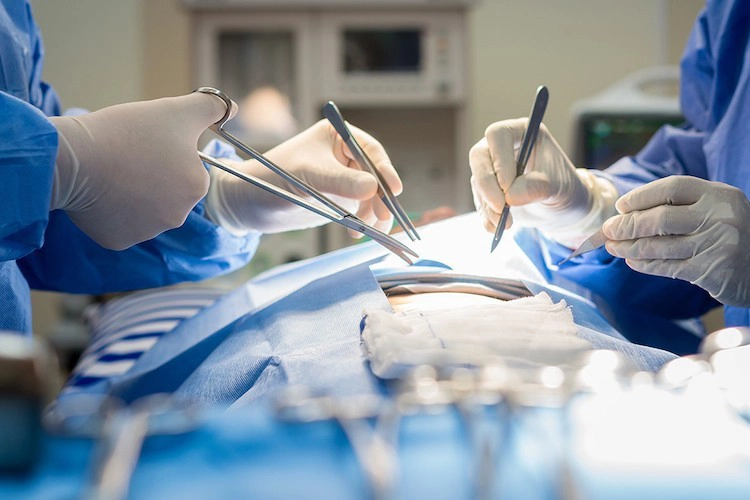Surgical Services

Surgical Services
Whether you require inpatient or outpatient surgical services, Memorial is able to provide high-quality care from our experienced and skilled staff. According to a third-party analysis, we have one of the lowest turnover times in the nation when compared to hospitals of similar size with similar cases. This means that our patients will typically have a shorter wait time leading up to an operation, and can get back to a normal life more quickly.
Next Steps
Our surgical specialties include:
- Cardiothoracic
- Cardiovascular
- Colon and rectal surgery
- Colon surgery
- Stomach and bowel resections
- Hemorrhoids, fissures and fistulas
- Dental/Oral
- Ear, Nose, and Throat (a department of Memorial Medical Center)
- Gastroesophageal Reflux (GERD) Surgery
- General surgery
- Minimally invasive surgery
- Robotic-assisted surgery
- Hernia repair
- Breast tumors
- Lumps and cysts
- Incarcerated hernia
- Extended extraperitoneal repair
- Gallbladder conditions
- Appendix surgery
- Gynecology
- Oncology
- Orthopedic
- Plastic
- Podiatry
- Robotic-assisted surgery
- Skin and soft tissue tumors
- Skin cancer and melanoma
- Spine
- Urology
- Vascular
Some outpatient surgery procedures can be performed at Memorial's HealthPlex location.

Robotic surgery
Read How Robotic Surgery Removed Colon Cancer
Our robotic platforms offer 10x magnification in 3D and is changing the surgical experience for both surgeons and our patients. In the future, numerous surgeons will use the robot at Memorial to perform surgeries requiring extreme precision.
Your surgeon is with you in the operating room, seated at the system console. This console gives your surgeon complete control of the tiny instruments he or she uses to perform your surgery, which move like a human hand but with far greater range of motion.
Among the many benefits for our patients:
- Smaller incisions and fewer surgical movements can mean less pain
- Hospital stays may be shortened
- Recovery times are potentially quicker
- Complications from blood loss and infection may be reduced
Among the many benefits for our surgeons:
- 10X magnification in 3D allows a clear, close view
- Greater dexterity eliminates possible tremor or shaking
- Precise, micro-movements enhances surgical maneuvers
What to Expect When you have Surgery at Memorial
Before Surgery
Once your physician has scheduled a surgery at Memorial, patients will begin by preregistering for the procedure. Patients can preregister up to 2 or 3 weeks before the day of surgery. Patients will visit our PMC (Perioperative Medical Clinic), located in the Main Lobby of Memorial Medical Center.
In the PMC, we will gather your medical and surgical history and get a list of your medications. While visiting the PMC, patients meet our nurse practitioner to discuss any concerns. All required preoperative testing will take place, such as laboratory tests or an EKG test. Patients will also be given instructions for what to do on the day of surgery and what to expect, including after their surgery. Patients will also review and sign surgery consent forms.
On the day before surgery, patients will receive a phone call or text message from the hospital with more information about when and where to arrive for their surgery.
On the Day of Your Surgery
Patients may have to arrive up to 2 hours before the surgery is scheduled. Once you have arrived, our team will check your vital signs and complete any follow-up testing that is needed, such as laboratory testing. You will be put into a hospital gown and an IV will be started. We will update your medical history and prepare you for surgery. Once prepped, patients again visit with the surgeon, anesthesia and operating room team. Once the surgery is confirmed with the surgical team, patients are connected to monitoring systems and the surgery will be performed.
After Surgery
After surgery, patients are moved to the PACU (Post Anesthesia Care Unit), also known as the recovery room. Patients here are monitored by our nursing team as the anesthesia wears off and they go through phases of recovery. The PACU team will make sure patients are awake and alert, that pain is being controlled, and that their vital signs, such as blood pressure, oxygen, and temperature, are stable. Once patients meet the standards of care for PACU, they can be discharged if they had an outpatient procedure, or transferred to the acute care floors if they need to be hospitalized.
Outpatient Surgery Department
Memorial Ear, Nose & Throat Institute is a department of Memorial Medical Center. When you see a physician or receive services in a provider-based clinic, you are technically being treated in an outpatient department of the hospital rather than the physician’s office. Please refer to “Understanding your Healthcare Costs” to learn how your bill may be affected when seen by a provider in a provider-based clinic.
Understanding Your Healthcare Costs
Provider-Based Clinics - You may see a charge on your bill for the equipment, supplies, and services provided in one of our provider-based clinics.
